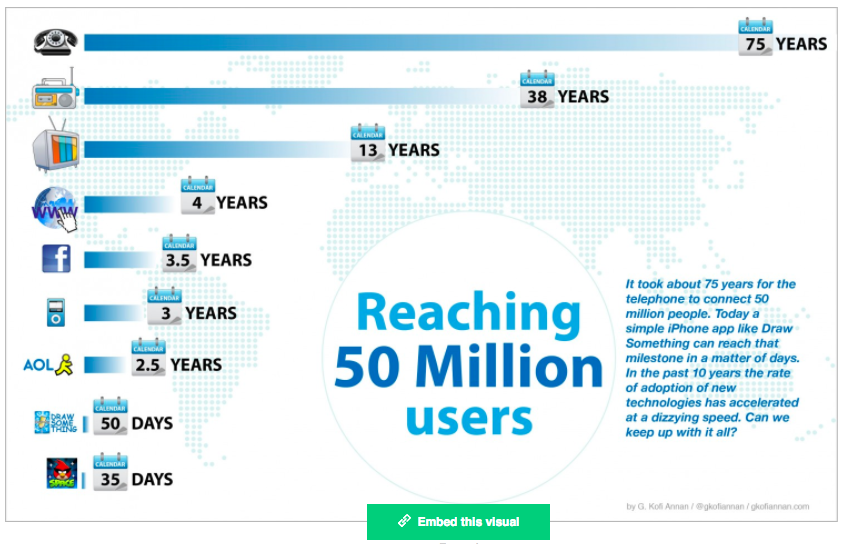You’ve probably seen some version of this infographic about adoption rates of new technology over the past 150 years:
I see this as just one indicator of the ramping up of the overall pace of change in our lives. Imagine living at the end of the 19th century and deciding whether to have a telephone in your house, or electric lighting. You could debate and think and argue about it for years without feeling like anything was passing you by or that there was any real pressure to make a decision. And meanwhile, the rest of your life would be flowing on, pretty much status quo. That was how we humans lived for thousands of years. And though I’m sure the 1890s felt very modern and fast to the people living through them (Traveling by train from New York to LA in less than 4 days! Women demonstrating for the right to vote!), most everyone spent their whole lives doing the same work, being a part of the same family, living in the same place, eating the same food, using the same tools and ways of doing things, having the same friends.
Now, all these core life elements can and do change regularly for most of us. And the decision about whether to adopt a new technology is made in a moment.…and then again the next moment. My conclusion? We need to get better at changing in order to thrive in the 21st century.
I’ve come to believe that fear of and unwillingness or inability to change are the biggest risks we face today. For instance, it’s at the heart of the political and cultural divide we’re living through in the US. Those who want to “make America great again” long to return to a time that makes sense to them, where white men made most of the key decisions and held most of the power; where industrial jobs were plentiful and stable and paid a wage that could support a whole family; where captains of business could do what they wanted and workers had to go along; where America was the most powerful nation in the world and called most of the shots; where science didn’t offer new and confusing and confronting realities on a daily basis; where women and people of color and non-christians and lesbians and gays didn’t speak up and didn’t have to be included in the conversation or the halls of power.
Sorry folks: it’s simply not going to happen. Once the genie of change has been let out of the bottle, nothing — not legislation or shouting, not violence or willful ignorance — is going to stuff it back in. And the present administrations’ attempts to drag us back to that earlier, less change-filled era are going to fail miserably.
What I’d suggest instead is that we get good at changing. That we manage our fear and resistance and learn to view radical, continuous change as an inevitable part of modern life. That we rely on those things that truly are universal and timeless — love, humility, courage, curiosity, joy. That we get good at learning quickly, adapting easily, and creating new habits and new ways of thinking. And that we learn to assess any new idea or thing as objectively as possible, so that we can respond in a way that supports the greatest good to the greatest number of people in this ever-changing world.
There’s no way back: we can only find the best way forward.


One comment
Alan Potts
September 18, 2018 at 6:22 am
Nice Post.